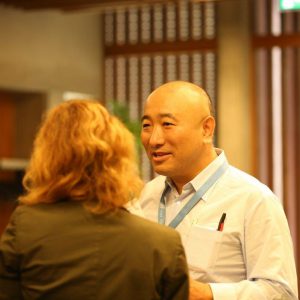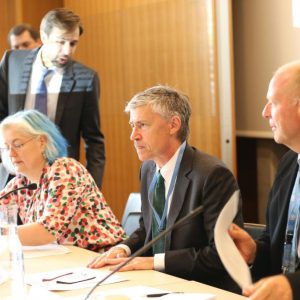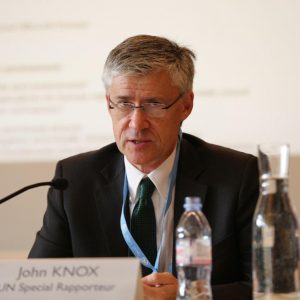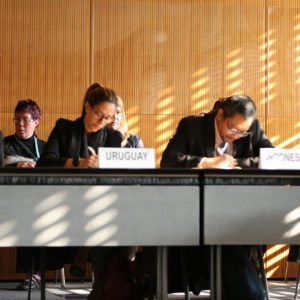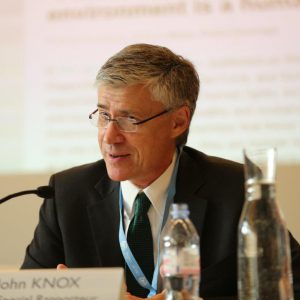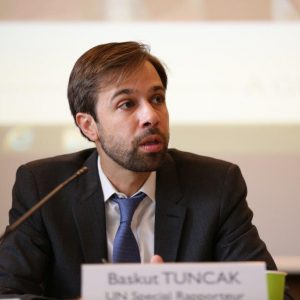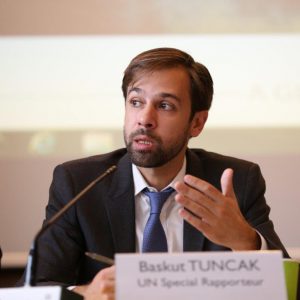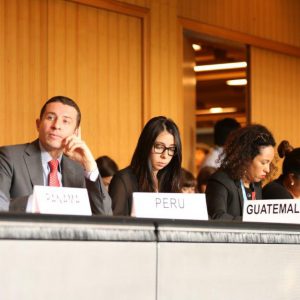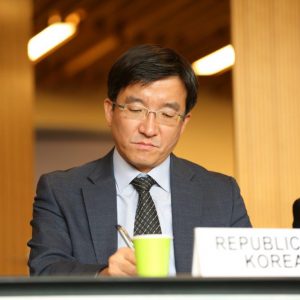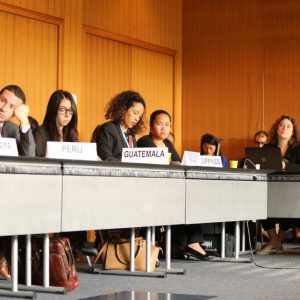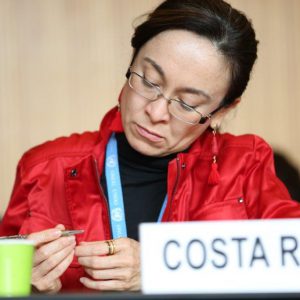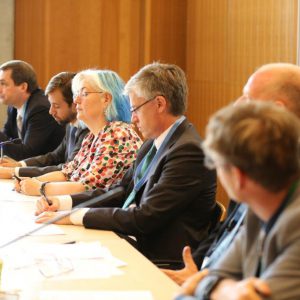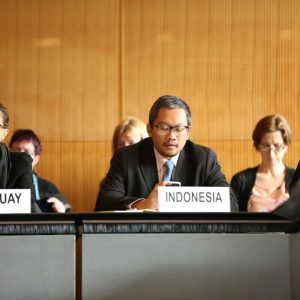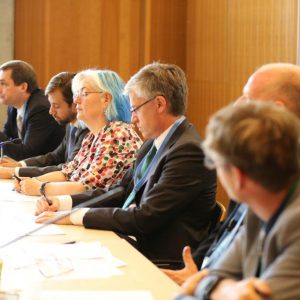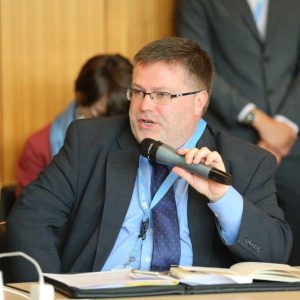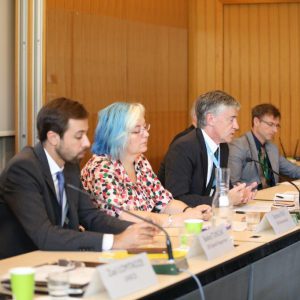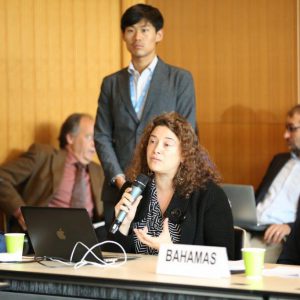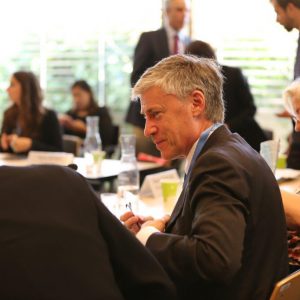Event
How can human rights contribute to the protection of the environment ?

A panel discussion on how can human rights contribute usefully to the protection of the environment took place at the International Environment House on Thursday 22 September 2016.
On 15 September, the UN Special Rapporteur “on the implications for human rights of the environmentally sound management and disposal of hazardous substances and wastes”, Baskut Tuncak, presented his report to the Human Rights Council on the rights of Children affected by hazardous substances and wastes. On 20-21 September, the UN Special Rapporteur “on human rights and environment”, John Knox, conducted an expert meeting on biodiversity and human rights, in the perspective of the report he will present to the Human Rights Council in March 2017. The Paris Agreement on climate change adopted in December 2015 includes a number of strong preamble references to human rights, for which 27 UN Special rapporteur had made a joint call in 2014.
In the presence of the two Special Rapporteurs mentioned above and of experts from environmental international organizations, the latest contributions of the human rights field to the protection of the environment were reviewed. Questions, challenges and achievements concerning the strengthening of the relation between these two fields were also discussed.
Agenda
10:00
Coffee & Tea
10:15
Welcome
Barbara RUIS, Legal Officer, UN Environment Regional Office for Europe
10:20
Panel Discussion
Human Rights contribution to the protection of the environment
John KNOX, UN Special Rapporteur “on human rights and environment”
Baskut TUNCAK, UN Special Rapporteur “on the implications for human rights of the environmentally sound management and disposal of hazardous substances and wastes”
Achim HALPAAP, Chief, UN Environment Chemicals and Waste Branch
Bruce GORDON, Coordinator of Water, Sanitation, Hygiene and Health, World Health Organization
Zaal LOMTADZE, Chief, Environment for Europe and Sustainable Development Section, Environment Division, UNECE
Gonzalo OVIEDO, Senior advisor, Social Policy Programme, International Union for Conservation of Nature
11:20
Questions and comments
11:50
Closing remarks
Nora KONIG, Councilor, Switzerland Permanent Mission to the United Nation Office in Geneva
Summary
See video online: https://www.facebook.com/UNECEpage/videos/10154435921818672/
For the first time the Human Rights & Environment Rapporteur and the Human Rights and Toxics rapporteur were on same panel, as they have different reporting lines at the Human Rights Council.
The panel was moderated by Barbara Ruis, Legal Officer for the UN Environment Regional Office for Europe.
The key appoints discussed are summarized below.
John Knox, UN special rapporteur on Human Rights & Environment:
- Mandate first created by the Human Rights Council in March 2012.
- Protecting the environment entails protecting basic human rights.
- There is a states’ obligation to environmental protection.
- Merging environment and human rights allows for new forms for considering environmental problems and involves new actors.
- Particular attention should be given to the most environmentally vulnerable (indigenous people, women and children).
- For more information on this mandate, please visit John Knox’s website.
Baskut Tunkar, UN special rapporteur on the implications for human rights of the environmentally sound management and disposal of hazardous substances and wastes, also called UN Special Rapporteur on Toxics:
- Importance of a life-cycled approach for addressing the issue of waste.
- New focus on the extractive industries, the nuclear sector, pharmaceuticals, manufacturing activities and waste.
- We need to raise awareness on toxics as a human rights issue, as this allows to focus on the most vulnerable, namely children, pregnant women, workers who are in relation with toxic substances, minorities, indigenous people, migrant communities and disabled persons.
- There is a lack of accountability for states and businesses. As 12 million people die each year from an unhealthy environment, states and businesses have to be held accountable for their actions and to respect human rights in their practices.
- We need an increased collaboration between the industry, the public health sector and environmental communities.
- The principle of precaution should be a priority for states. There are numerous gaps in national and international legislations, which result in double standards, especially in developing countries who turn out to be more vulnerable to this issue.
- For more information on this mandate, please visit Baskut Tunkar’s website.
The special rapporteur on Human Right and Toxics also insisted on:
- unique vulnerability of children
- need to raise awareness
- 2 million workers die each year through work-related accidents and diseases linked to exposure to hazardous substances. These data coming from ILO show that the implementation of the sustainable development goals needs collaboration among UN facilities.
- children everywhere are being born pre-polluted
- human rights provide stronger narrative for protection
Achim Halpaap, Chief of the Chemicals and Waste Branch at UN Environment:
He explained that despite the fact that the Agenda 21 was adopted in 1992, there still are 30,000 chemicals on the market today. The impact of these chemicals on people and on the environment is dramatic, namely on the neurological development of children, with more than 6,000 premature deaths per year because of lead. States should share their knowledge on good practices and capacity development in order to develop basic regulatory capacities for chemicals management.
Bruce Gordon, Coordinator of Water, Sanitation, Hygiene and Health at the World Health Organization (WHO):
He mentioned the states’ obligations to provide an enabling environment in a transparent manner and underlined the fact that ensuring basic human rights such as the right to sanitation guaranteed a clean chain of water and preserved the environment.
Zaal Lomtadze, Chief for the Environment for Europe and Sustainable Development Section at the United Nations Economic Commission for Europe (UNECE):
He insisted on three points:
- The need to implement international legislations at the state level and for institutions to broaden their bases so that they recognise environmental rights. In this regard, the competition between states and businesses in order not to be held accountable for environmental threats is indirectly benefitting human rights.
- The persecution of environmental activists which is a very alarming matter, as 185 activists were murdered for protecting environmental rights in 2015.
- The need to promote cooperation through the sharing of good practices among states.
Gonzalo Oviedo, senior advisor for the Social Policy Programme at the International Union for the Conservation of Nature (IUCN):
He stressed the importance of ecosystems and biodiversity for the full enjoyment of human rights. Conservation thus has to be supportive of the rights of people, especially those who depend on nature for their survival, such as indigenous and rural people. In this regard, the IUCN created the Conservation Initiative for Human Rights, a tool to develop, promote and institutionalise a human rights approach to conservation.
Nora Kroning, councillor at the Swiss Permanent Mission to the United Nation Office in Geneva, listed links and opportunities for collaboration.
More information and documents
SR Environment website: srenvironment.org
SR Toxics website: www.srtoxics.org
IUCN Conservation Initiative on Human Rights to promote integration of human rights in conservation work: https://www.iucn.org/content/iucn-and-members-form-conservation-initiative-human-rights
https://www.genevaenvironmentnetwork.org/wp-content/uploads/2020/05/summary_22_september_2016.pdf




